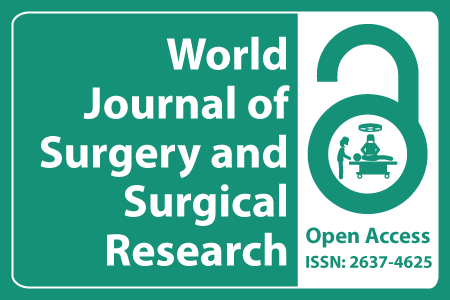
Journal Basic Info
- Impact Factor: 1.989**
- H-Index: 6
- ISSN: 2637-4625
- DOI: 10.25107/2637-4625
Major Scope
- General Surgery
- Hepatology
- Surgical Oncology
- Spine Surgery
- Gynecological Surgery
- Ophthalmology & Eye Surgery
- Orthopaedic Surgery
- Vascular Surgery
Abstract
Citation: World J Surg Surg Res. 2021;4(1):1307.DOI: 10.25107/2637-4625.1307
Single-Centre Experience of Enhanced Recovery after Esophagectomy: A Retrospective Study Evaluating a Prospectively Maintained Database
Mohamed Ramadan1,2*, Abbas Kadhim1, Ali Haque3, Essa M Aleassa4,5, Gareth Morris-Stiff1,4 and Ahmed Hassn1
1Department of Surgery, Princess of Wales Hospital, UK
2Department of Surgery, Rotherham NHS Foundation Trust, UK
3Frimley Park Hospital, Surrey, UK
4Department of Hepato-Pancreato-Biliary Surgery, Digestive Disease and Surgery Institute, Cleveland Clinic
Foundation, USA
5Department of Surgery, College of Medicine and Health Sciences, United Arab Emirates University, UAE
*Correspondance to: Mohamed Ramadan,
PDF Full Text Research Article | Open Access
Abstract:
Background: Recently, ERAS® Society has produced guidelines specific to esophagectomy, however,
not yet proven to be practical. We aimed to evaluate our enhanced recovery protocol through
stepwise implementation of five changes to the traditional practice in esophagectomy.
Methods: Between 2008 to 2017, sequential changes were studied in 98 consecutive patients
undergoing a two-stage esophagectomy for cancer. Changes included laparoscopic gastric
mobilization, intercostal block instead of thoracic epidural, one chest drain with a Heimlich valve
and avoidance of opiate analgesia. The patients were divided into three groups. Patients who had
hybrid minimally invasive esophagectomy with no other changes were considered as Group A, those
who had the first three changes as Group B and patients who had all the changes applied as Group C.
Results: In the 98 included patients, the rates of the mild and the severe pulmonary complications
were 12.2% (12 patients) and 5.1% (5 patients) respectively. Of these, 9 patients were in group A,
5 were in group B and only three patients in group C (P=0.005). Severe significant pulmonary
complications occurred in 2 in group A, 2 in group B and 1 in group C (P=0.870). The median length
of hospital stay has decreased significantly to 5 (4 to 9) days (P=0.004). Overall morbidity rate was
24%; 30-day and 90-day mortality rates were 2% and 3% respectively.
Conclusion: Enhanced recovery protocols can be safely applied to hybrid minimally invasive
esophagectomy and is associated with a reduction in respiratory morbidity.
Keywords:
Cite the Article:
Ramadan M, Kadhim A, Haque A, Aleassa EM, Morris-Stiff G, Hassn A. Single-Centre Experience of Enhanced Recovery after Esophagectomy: A Retrospective Study Evaluating a Prospectively Maintained Database. World J Surg Surgical Res. 2021; 4: 1307..













